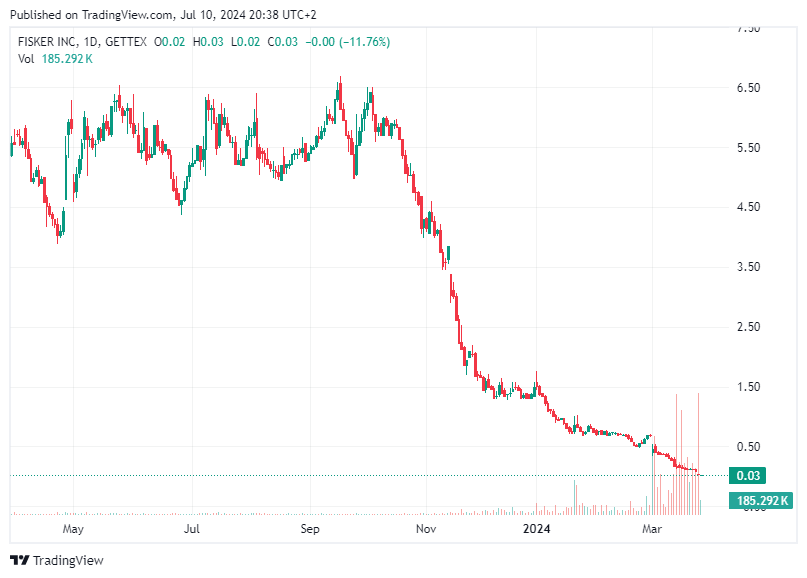Lucid and Fisker Recall Thousands of EVs Over Safety Concerns
Lucid and Fisker Recall Thousands of EVs Due to Safety Concerns.

Disclaimer: The information provided in this article is based on current data and news reports. It is intended for informational purposes only and should not be construed as legal or professional advice. Please consult with a professional for specific guidance related to vehicle recalls and safety concerns.
Real-time information is available daily at https://stockregion.net
Both Lucid Group and Fisker Inc. have initiated recalls involving thousands of their recently manufactured vehicles due to safety issues that could potentially lead to a loss of power. These recalls highlight the ongoing challenges faced by emerging EV companies as they strive to balance innovation, safety, and regulatory compliance.
Fisker Inc., an electric-vehicle startup headquartered in Manhattan Beach, California, announced on Wednesday that it would be recalling a number of its vehicles in North America and Europe. Specifically, the company is "voluntarily recalling" 11,201 Fisker Oceans across the U.S., Canada, and Europe. The root cause of this recall is identified as software issues that may trigger the vehicle to enter a safe state protection mode, which can result in a loss of motor power. Fisker is addressing non-compliance with the Federal Motor Vehicle Safety Standards (FMVSS) related to gauges and telltale icons in the vehicle's cluster display. This particular issue affects 6,864 Fisker Oceans in the U.S. and 281 units in Canada. In response, Fisker plans to deploy an over-the-air update to rectify these software malfunctions by June 30. Vehicles that have already received the latest software update are not subject to this recall.
The U.S. National Highway Traffic Safety Administration (NHTSA) has been actively investigating Fisker's Ocean SUV, the company's sole model currently in production. The investigation encompasses four safety-related incidents, with the most recent probe focusing on complaints regarding the inadvertent activation of the automatic emergency braking system. Such issues shows the critical importance of robust safety systems in EVs and the complexities involved in meeting stringent safety standards.
Compounding these operational challenges, Fisker's Austrian unit filed for bankruptcy protection in May. This financial setback comes at a time when the company is actively seeking investment options following the collapse of negotiations with a major automaker for potential investment. These financial difficulties further complicate Fisker's efforts to establish a stable footing in the highly competitive EV market.

Lucid Group's Recall Efforts
While specific details about Lucid Group's recall were not provided in the initial report, it is evident that similar safety concerns have prompted the company to take precautionary measures. Lucid Group, known for its luxury electric sedans, is committed to addressing any potential risks associated with its vehicles to ensure customer safety and maintain regulatory compliance. The recalls initiated by Fisker and Lucid Group are part of a broader trend in the automotive industry, particularly among new entrants in the EV sector. As these companies push the boundaries of technology and innovation, they inevitably encounter challenges related to software reliability, hardware performance, and regulatory compliance. Recalls, while costly and potentially damaging to brand reputation, are a necessary step to rectify safety issues and demonstrate a commitment to consumer protection.
One notable aspect of Fisker's recall strategy is the implementation of over-the-air (OTA) updates to address software-related issues. OTA updates allow manufacturers to remotely update the vehicle's software without requiring owners to visit a service center. This approach not only enhances customer convenience but also enables quicker resolution of issues, thereby minimizing the impact on the vehicle's usability. OTA updates have become increasingly prevalent in the automotive industry, particularly among EV manufacturers. They offer a versatile solution for deploying critical updates, improving vehicle performance, and introducing new features, all while reducing the need for physical recalls.
Regulatory Landscape and Compliance
Compliance with regulatory standards such as the FMVSS is paramount for all automakers operating in the United States. These standards encompass a wide range of safety requirements, including crashworthiness, crash avoidance, and post-crash survivability. Non-compliance can result in penalties, legal liabilities, and reputational damage. For startups like Fisker, navigating the complex regulatory landscape poses unique challenges. Unlike established automakers with extensive experience and resources dedicated to regulatory compliance, new entrants must rapidly develop and implement robust processes to meet these stringent requirements. This often involves investment in testing, quality assurance, and legal expertise.
The recalls by Fisker and Lucid Group serve as a reminder of the ongoing evolution of EV technology and the importance of continuous improvement in safety systems. As the EV market matures, we can expect to see advancements in battery technology, autonomous driving capabilities, and overall vehicle safety. These innovations must be accompanied by rigorous testing and adherence to regulatory standards to ensure consumer trust and widespread adoption.
The recent recalls by Fisker and Lucid Group highlight the inherent challenges faced by new entrants in the electric vehicle market. These companies are navigating a complex landscape of technological innovation, regulatory compliance, and financial sustainability. While recalls can pose short-term challenges, they are essential for addressing safety concerns and maintaining consumer confidence.
As the EV industry continues to grow, manufacturers must prioritize safety, quality, and compliance to succeed in this competitive market. The experiences of Fisker and Lucid Group reveal the importance of proactive measures, such as OTA updates, to swiftly address issues and enhance vehicle performance. Ultimately, the commitment to continuous improvement and adherence to regulatory standards will play a crucial role in shaping the future of electric mobility.
Disclaimer: The information provided in this article is based on current data and news reports. It is intended for informational purposes only and should not be construed as legal or professional advice. Please consult with a professional for specific guidance related to vehicle recalls and safety concerns.
Real-time information is available daily at https://stockregion.net


